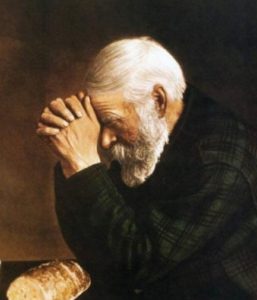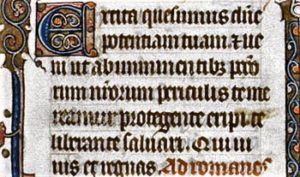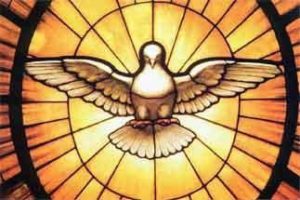See What Comes Up
by Fr. Gerard Saguto, FSSP
We all have blind spots about ourselves and situations we may be in, and the realization of such things can be quite the exercise in humility.
For those who are fans of the old Far Side comic strip by Gary Larson, part of his brilliance was his ability to capture how humanity is prone to missing the obvious. In one such frame, a building that houses a ladder company is on fire, and as the employees look out from a third story window, the caption has them wishing how they could find a way to climb down. We laughed hard.
One reason for our personal blind spots and missing the obvious can be a lack of courage to face ourselves. Another is the fallen-nature blindness that affects us all and inclines us to take for granted things that we are used to: be it a spouse, family, friends, health, employment, position, or other things.
 As this unfolds, we lose sight of the individual trees that make up the forest. We start to get sloppy; our fallen tendency to search out the path of least resistance becomes more insistent. If left unchecked, we find ourselves in a rut where it seems we are just spinning the wheels; meaning about things that should be important gets confused, or even lost, and a frustration with life begins to set in.
As this unfolds, we lose sight of the individual trees that make up the forest. We start to get sloppy; our fallen tendency to search out the path of least resistance becomes more insistent. If left unchecked, we find ourselves in a rut where it seems we are just spinning the wheels; meaning about things that should be important gets confused, or even lost, and a frustration with life begins to set in.
However, there are a couple of ways to regain perspective and renew vigor.
It can happen from a negative event; that is, when someone or something becomes threatened in such a way that forces us to look at it with the attention it deserves. The illness of a spouse or child, the moving away of a close friend, the loss of a job or health can all be real motivating factors to help us realize the genuine value of something. The heartfelt acknowledgment of potential loss is a sure-fire way of checking contempt and correcting things. The benefit and usefulness of suffering is evident in such instances, at least in hindsight.
Positively, perspective and vigor can also be reclaimed by personal initiative and vigilance to make sure we do not get into ruts with the things that are supposed to be most important, that we are mindful of the obvious in such matters (kind of ironic when you hear it said that way). Hence the old adage that “an ounce of prevention is worth a pound of cure.”
Such initiatives and efforts need not be tiresome, but the sacrifice that goes into being thoughtful and present has a cost, be it in personal time or convenience. Even more so, things that are most important also have an uncanny ability to expose our personal limits and insecurities, which we find threatening as they leave us open to criticism, and so engaging them carries its own risks. But with any worthwhile risk comes the true opportunity for growth: a gaining of self-knowledge, peace, perspective, and competency.
 Our Holy Faith often falls victim to being taken for granted. While a routine and discipline are important (assuming these has been achieved in some measure), mindless routine and lack of discipline prey upon the vitality we, deep down, sense the Faith should inspire. Sure, we believe in what the Church proposes for us to believe because it comes from Jesus Christ, but that needs to penetrate more deeply and be pulled in from its ethereal orbit around our souls.
Our Holy Faith often falls victim to being taken for granted. While a routine and discipline are important (assuming these has been achieved in some measure), mindless routine and lack of discipline prey upon the vitality we, deep down, sense the Faith should inspire. Sure, we believe in what the Church proposes for us to believe because it comes from Jesus Christ, but that needs to penetrate more deeply and be pulled in from its ethereal orbit around our souls.
With Advent upon us, the evident threats posed from the secular world compel us all to make concerted efforts to keep “Jesus as the reason for the season.”
The threats certainly have increased in intensity in recent years; even the lukewarm Christian can sense this and perhaps feels the need to join in the resistance and push back. To be a contributing part of this effort requires that our Lord possesses a key place in our hearts. But how to do so when belief seems so uncertain or dark?
This side of eternity, there will always be a certain obscurity to Faith because God wishes that we walk in trust of Him; He wants to lead us because our sanctification is His work with our cooperation. Without Me, you can do nothing (Jn. 15:5).
Adam and Eve tried to steal a glimpse of something they should not have, to put themselves in a position of control they could not have, and that is why faith was so insisted upon by our Lord throughout the Gospel. He is in control, and our fidelity in things both small and large is what obtains for us the supernatural insights into His very life and designs. We wait for the coming of the Son of God-made-Man, the focal point of all history, the only God there is, born to hang on a Cross and redeem us from our sins.
This cannot become ho-hum, but we know there is always a danger of that, or getting stuck in a rut. So does the Church.
 No wonder then, that at the beginning of the liturgical year the Church employs the imperative Excita – Stir up! in the Mass prayers of Advent. We are Baptized and likely Confirmed; that means that graces come with these two sacraments that put us on a path to meet God, throughout this life, at our judgment, and hopefully face-to-face in heaven for eternity. Baptism and Confirmation have left an “indelible mark” on our souls that can never be erased, courtesy of the Holy Ghost, from which Christ identifies us as citizens of His Kingdom and belonging to Him.
No wonder then, that at the beginning of the liturgical year the Church employs the imperative Excita – Stir up! in the Mass prayers of Advent. We are Baptized and likely Confirmed; that means that graces come with these two sacraments that put us on a path to meet God, throughout this life, at our judgment, and hopefully face-to-face in heaven for eternity. Baptism and Confirmation have left an “indelible mark” on our souls that can never be erased, courtesy of the Holy Ghost, from which Christ identifies us as citizens of His Kingdom and belonging to Him.
If the Holy Ghost impressed them, that means He is always ready to “stir up” their consequences – a renewed and invigored faith, courage to tackle the obstacles that challenge its practice, be it in our own soul or in the world, for the love of God and neighbor in the imitation of Christ.
 In our troubled times, make it a personal initiative through Advent (and perhaps beyond) to invoke the Holy Ghost daily, that He indeed “stirs up” this treasure-chest of graces we hold within ourselves and our families. Use those words.
In our troubled times, make it a personal initiative through Advent (and perhaps beyond) to invoke the Holy Ghost daily, that He indeed “stirs up” this treasure-chest of graces we hold within ourselves and our families. Use those words.
Unite such an invocation with our Lord’s true presence in the nearest Tabernacle, a most important and “obvious” belief of the Holy Faith. If we know of loved ones who have wandered, ask the same for them, that they begin to sense the “obvious” need for the Church and the Sacraments, particularly Holy Communion and confession. And for conversions we pray for, remember that among the Christian “denominations” there is only one Baptism – it belongs to the Catholic Church – so ask the Holy Ghost to “stir up” in them the courage to see where the blind spots are in their profession of faith.
The glad tidings of Christmas should be obvious to anyone who believes. This is the will of God, your sanctification (1 Thess 4:3).
Light and life to all He brings, throwing light on our blind spots, provided of course that we give the Infant in the Manger the attention He rightfully deserves.
December 2, 2020








